
In a matter of days, the eyes of the world will fall upon Sochi, Russia, for the 2014 Winter Olympic Games. And while the sports are set to take center stage, I couldn’t help but wonder what technology would be at play behind the scenes. Would the athletes have easy access to high-speed Internet? Will the Russian government use digital surveillance to crack down on gay Olympians? How are they going to stop the impending threat of terrorism? Here’s what I found.
Everything is under surveillance
Think the NSA surveillance activities are intrusive? They pale in comparison to the level of scrutiny Russia’s government will be giving to the people at the 2014 Games. According to the Guardian, Russia’s Federal Surveillance Service (FSB) plans to employ something known as “SORM boxes” (SORM stands for System of Operative-Investigative Measures), which give them the ability to monitor most communications, search text messages and emails for keywords, and track technology users’ locations.
The SORM boxes are so powerful that the US Department of State recommends that anyone going to Sochi (or elsewhere in Russia) considers “travelling with ‘clean’ electronic devices” to help protect secret data. And “if you do not need the device, do not take it.”
Yes, there is Internet (and LTE!)
Sochi is not some backwater hamlet – in fact, it has a population of nearly 500,000, making it Russia’s largest resort town. As such, Sochi has a fairly robust technological infrastructure. Internet access can be found at most hotels (at least the ones that are not still under construction), and there are still some Internet cafes, according to WikiTravel.
The best bet for getting online, however, may be through a wireless connection. While a number of wireless providers service Sochi, MegaFon is the “official” mobile provider for the Games. The company has opened its 3G network to other carriers to help ease some of the expected congestion. But to access 4G LTE service, Olympians and fans will need to have service through MegaFon or Rostelecom, which launched its LTE network in Sochi earlier this year.
Beware gay dating apps
Russia’s oppressive law against gays and lesbians has shrouded this year’s Olympics in a veil of ugliness and uncertainty for athletes and sports fans, who may or may not be arrested for simply being themselves at the 2014 Games. And the recent fate of Hunters, a popular Russian gay dating app similar to Grindr, may foreshadow what’s to come.
According to the founders and CEO of Hunters (via Towerload), the app was recently hacked to show users a message that read, “You will be arrested and jailed for gay propaganda in Sochi according to Russian Federal Law #135 Sektion 6.” The app was then blocked in Sochi. The Hunters team believes the Russian government is behind the hack of the app.
Let it snow
Just saying the word “Russia” can cause some people to shiver. But Sochi is not the barren wasteland of ice and snow you might think it to be. In fact, it has a “subtropical” climate, and is on the same latitude as Toronto, Canada, and Nice, France. So, while it is technically winter in Sochi, it’s not actually that cold – it’s expected to be in the low 50s on Friday, when the Opening Ceremonies kick off.
Because of this, Russia has rolled in countless high-powered snow cannons to ensure that the skiers aren’t trudging through mud. Leading the effort is a Finnish company called SnowSecure, which has reportedly stockpiled some 500,000 cubic meters of snow that can be spread out in the event of some pesky sunshine.
Drones are watching
The threat of terrorism at this year’s Games is palpable due to a wide variety of factors. To help keep things calm during the world’s biggest sporting event, some 70,000 police officers and tens of thousands of other government security personnel will be monitoring the games. But, of course, this wouldn’t be a 21st century event without a couple of drones getting in the mix. The robotic vehicles will be patrolling from both the sky and the ground, with robotic bomb detectors helping the packs of bomb-sniffing dogs employed to keep the Olympics from turning into a historic disaster, reports CBC. Russia will also use sonar, anti-ballistic missiles, and underwater machine guns – you know, just in case.
(Image courtesy of Mikkel Bigandt via Shutterstock.com)


